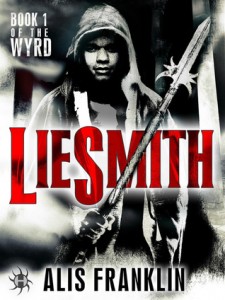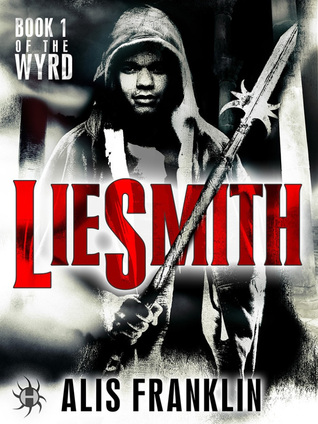 Format read: ebook provided by the publisher via NetGalley
Format read: ebook provided by the publisher via NetGalleyFormats available: ebook
Genre: urban fantasy
Series: The Wyrd #2
Length: 374 pages
Publisher: Random House Hydra
Date Released: July 21, 2015
Purchasing Info: Author’s Website, Publisher’s Website, Goodreads, Amazon, Barnes & Noble, Kobo
Ragnarok—aka the end of the world—was supposed to doom the gods as well. Instead, it was a cosmic rebooting. Now low-level IT tech and comic-book geek Sigmund Sussman finds himself an avatar of a Norse goddess. His boyfriend, the wealthy entrepreneur Lain Laufeyjarson, is channeling none other than Loki, the trickster god. His best friends, Em and Wayne, harbor the spirits of slain Valkyries. Cool, right?
The problem is, the gods who survived the apocalypse are still around—and they don’t exactly make a great welcoming committee. The children of Thor are hellbent on reclaiming their scattered birthright: the gloves, belt, and hammer of the Thunder God. Meanwhile, the dwarves are scheming, the giants are pissed, and the goddess of the dead is demanding sanctuary for herself and her entire realm.
Caught in the coils of the Wyrd, the ancient force that governs gods and mortals alike, Sigmund and his crew are suddenly facing a second Ragnarok that threatens to finish what the first one started. And all that stands in the way are four nerds bound by courage, love, divine powers, and an encyclopedic knowledge of gaming lore.
My Review:
The road FROM Hel is also paved with good intentions. And every story needs a villain – but it doesn’t need to be the SAME villain. Not even when that villain is Loki.
One last important point, by way of the American humorist Will Rogers, “It isn’t what we don’t know that gives us trouble, it’s what we know that ain’t so.” There are all too many people (and beings) in Asgard that think they know all about Loki and his lies and betrayals, only to discover that what most of them know is wrong, and it’s that wrong that gets everyone in seriously big trouble.
 Stormbringer picks up right where Liesmith left off. And if you haven’t read the absolutely awesome Liesmith, Stormbringer is going to be more than a teensy bit confusing. On the other hand, Liesmith is utterly fantastic urban fantasy, so if you love UF, go get Liesmith.
Stormbringer picks up right where Liesmith left off. And if you haven’t read the absolutely awesome Liesmith, Stormbringer is going to be more than a teensy bit confusing. On the other hand, Liesmith is utterly fantastic urban fantasy, so if you love UF, go get Liesmith.
A lot of the things that Asgard believed about Ragnarok come not quite true at the end of Liesmith. (It helps if you know a little about Norse mythology, but deep knowledge isn’t strictly necessary).
Way back in the day, over 1,000 years ago, Odin had plans to subvert Ragnarok by having his beloved son Baldr and his always sacrificed frenemy Loki body swap. Unfortunately for Odin, Loki’s wife Sigyn did a swap of her own, and attended Ragnarok in Loki’s place wearing Loki’s armor. So Baldr and Loki stayed swapped. For a millenia. It messed them both up something awful. Naturally.
Asgard has never recovered from what it perceived as Loki’s betrayal. He wasn’t guilty, but since the prevailing mythos that surrounds Loki is that he is always guilty, everyone acted on that belief, often to their detriment, nearly always to Loki’s.
The story in Stormbringer is all about a whole bunch of Asgardians believing that Loki is the root of all evil, and treating him so horribly that while it can definitely be argued that they are way more evil than anything Loki is even thought to have done, he feels forced to do some fairly bad stuff to fix the mess he has walked into.
Meanwhile, back at the Lokabrenna ranch, Loki’s daughter Hel enlists Sigmund and his friends Wayne and Em on a quest of her own. It turns out that Hel set up a whole chunk of the events in Liesmith for her own purposes. She wants to get her people, the supposedly dishonored dead into Valhalla. But Valhalla is only for those who died in battle, which Hel has finally done.
That not many people die in battle these days has caused a serious population explosion in Hel. Their goddess wants to remedy that by getting them all into Valhalla, and by the way reuniting the dead warriors in Valhalla with their not-illustrious but still beloved wives and small children, who generally did not die gloriously in battle.
So while Loki is being abused all over Asgard and the associated realms by one group, Hel, with Sigmund and Wayne and Em recreate Aragorn’s march from the Paths of the Dead from Return of the King by heading towards Valhalla. The difference is that Aragorn’s march was intended to end in a battle. Hel hopes for peace and reunification, and only ends up with a battle after someone cheats.
The story, like Liesmith, ends with a surprising bang, and goes nowhere that anyone involved, including the reader, ever imagined.
And it’s utterly cool.
Escape Rating A-: One of the things that always gets me about modern interpretations of Loki stories is that Loki is always evil and the big villain. Except he wasn’t. He was a trickster god, a chaos agent. Every mythology seems to have one.
Chaos is not necessarily evil per se, but it is always upsetting to those who benefit from the current status quo and don’t want anything to change.
When Stormbringer begins, Loki and Baldr are both kinda sharing the body of Lain Laufeyjarson, who isn’t either of them exactly, but isn’t not, either. It’s as confusing for Lain and his boyfriend Sigmund as it may be for the audience. The entire confusion factor is much higher because Sigmund is the reincarnation (more or less) of Loki’s wife Sigyn, and his BFFs Wayne and Em, who are both female in spite of Wayne’s name, are reincarnations of Valkyries.
Hel needs Sigmund’s Valkyrie friends. Lain needs Sigmund to rescue him from the mess he has been dropped into, only partly of his own making, in Asgard. And Asgard and all of the other realms surrounding it need to seriously get themselves updated from the 10th century to the 21st.
A lot of what goes wrong on the Asgard side revolves around not paying attention and not keeping up. The Earth has moved on from the days that the Vikings went a-Viking, but Asgard never got the memo. And that’s in spite of warriors in the intervening centuries who have found themselves in Valhalla, WITH all their kit.
So there are two stories going on, Thor’s kids taking Lain on what they believe is a one-way trip to retrieve their father’s treasures by way of a past that never was, and Sigmund and his friends supporting Hel in what becomes a 20th century style protest movement against a tyrannical regime that has gone on way too long.
The story is crazy wild and utterly absorbing. I did find myself wishing I knew a bit more about Norse mythology, but that’s just me. There is enough explanation to get the reader through the mythical bits.
The Asgardians, who are all-too-appropriately called as, pronounced ass, have acted like asses to everyone around them. The reader wants them to get their comeuppance. Lain falls all too far into the trap of being Loki, and discovers that he really needs Sigmund to keep him making good decisions. Sigmund discovers that he can be a hero with a little help from his and Lain’s friends. It makes their relationship just a bit more equal.
But the thing I loved most about this story was the way that the eventual solutions to the mess all come from women’s ideas and women’s decisions. Not just Hel, but also Wayne and Em and Thor’s daughter Trud and especially Baldr’s wife Nonna. With a little bit of help from the Loki’s other daughters and the part of Sigyn that lives in Sigmund.
Even though the majority of this story is set in Asgard, I would have preferred that the author had stuck to the common English translations or transliterations of most of the names. It is possible to get a bit lost, especially attempting to search Wikipedia for what else is known about some of the characters.
On that infamous other hand, that Lain’s car turned out to be Sleipnir was just plain awesome.
~~~~~~ TOURWIDE GIVEAWAY ~~~~~~
As part of the tour, the giveaway is a $25 gift card to the eBook retailer of the winner’s choice + eBook copy of LIESMITH by Alis Franklin


